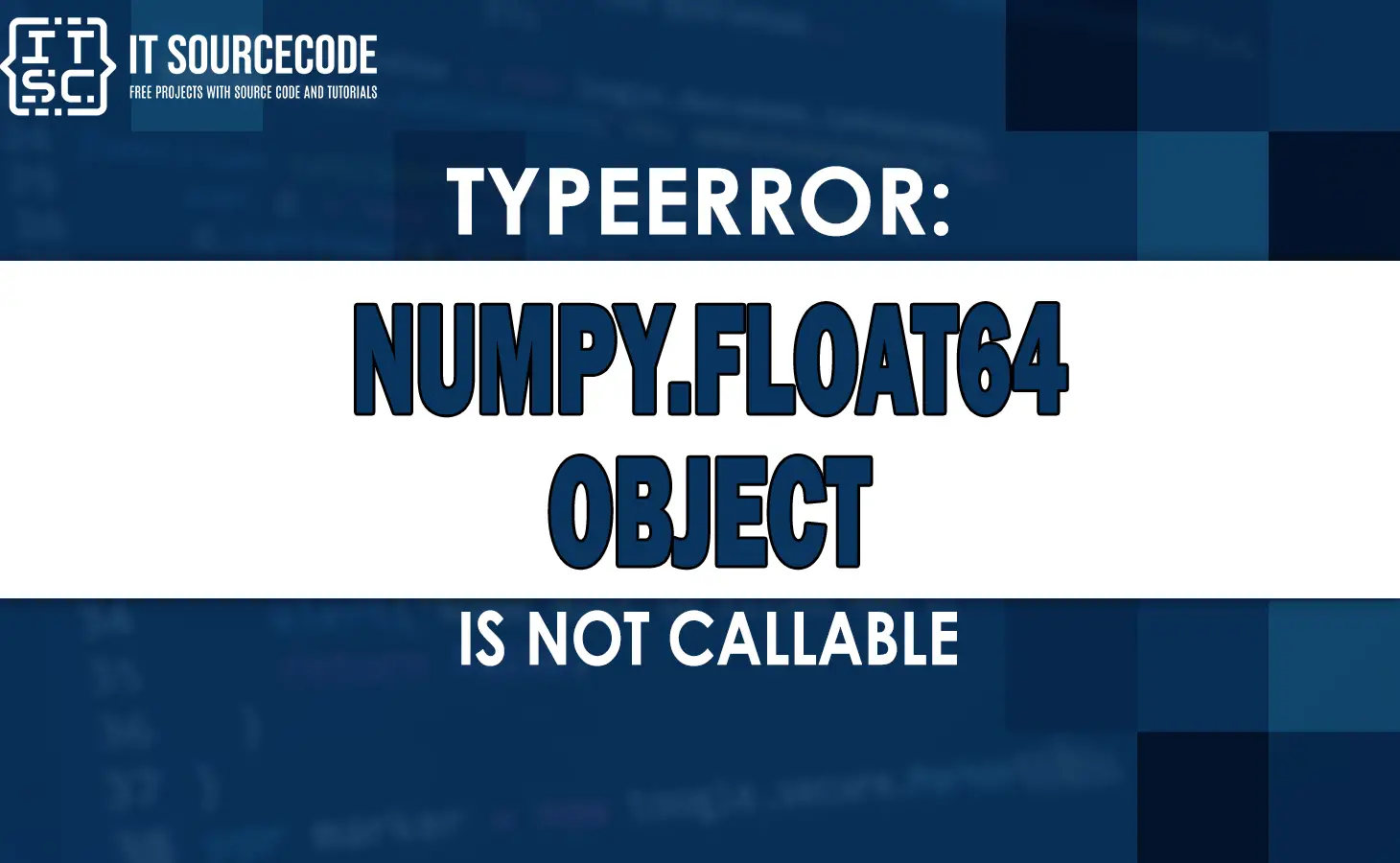This article explains how to solve the error message typeerror: numpy.float64 object is not callable. This error occurs only in one situation.
Why does the typeerror: ‘numpy.float64’ object is not callable occur?
The error ‘numpy.float64’ object is not callable typically occurs because you are trying to call a NumPy float64 object as if it were a function.
Here’s an example on how the error occur:
import numpy as np
x = np.float64(3.14)
y = x(2)In this example, x is initialized as a numpy.float64 object with the value 3.14.
Next, the line attempts to call x as if it were a function with the argument 2, which is not valid.
If we run the example code, the output will be raise an error:
Traceback (most recent call last):
File “C:\Users\Dell\PycharmProjects\pythonProject\main.py”, line 4, in
y = x(2) # trying to call x as if it were a function with argument 2
TypeError: ‘numpy.float64’ object is not callable
Common causes of numpy float64 object is not callable
There are multiple common causes of “numpy.float64 object is not callable” error, as follows::
- You’re using parentheses instead of brackets to access elements of a NumPy array.
- You are using parentheses instead of brackets to perform mathematical operations on float64 objects.
- Accidentally overwriting a function with a float64 object of the same name.
How to fix the error ‘numpy.float64’ object is not callable?
Here are the solutions you need to follow to solve the error ‘numpy.float64’ object is not callable:
Solution 1: Remove Parenthesis
For example:
import numpy as np
x = np.float64(3.14)
y = x(2.0)The second line tries to call x as if it were a function with argument 2.0. This will result in “numpy.float64 object is not callable” error.
To solve this error, you need to remove the parenthesis and modify the second line of your code.
We will use a mathematical operation that is valid for float64 objects, such as addition, subtraction, multiplication, or division.
For example, if you want to multiply x by 2, you can use the following code instead:
import numpy as np
x = np.float64(3.14)
y = x * 2.0
In this example, we remove the parenthesis an we change it to multiplication; operator * is used instead of calling x as a function, which will correctly calculate y as 6.28.
Output:
6.28
Solution 2: Use Brackets Instead of Parentheses
The second step to solve this error is using brackets instead of parenthesis when indexing or slicing numpy arrays.
This is because parentheses are used to call functions, whereas brackets are used for indexing and slicing.
Let’s take a look at the example, instead of this code:
import numpy as np
x = np.array([1, 2, 3])
y = np.float64(5)
result = y(x[0])
Output:
Traceback (most recent call last):
File “C:\Users\Dell\PycharmProjects\pythonProject\main.py”, line 6, in
result = y(x[0])
TypeError: ‘numpy.float64’ object is not callable
You can write this code:
import numpy as np
a = np.array([1, 2, 3])
b = np.float64(5)
result = b
print(result)Output:
5.0
Solution 3: Check for Overwriting of Functions
Another way to solve this error is to check if you have accidentally overwritten a function with a float64 object of the same name.
This will happen if you are assigning a float64 object to a variable that has the same name as a function that you want to use later.
For example: let’s say you have a function example that you want to use in your code, but you accidentally assign a numpy.float64 object to the variable example:
import numpy as np
def example(x):
return x + 1
example = np.float64(5)
result = example(3)Then the expected output will raise an error:
Traceback (most recent call last):
File “C:\Users\Dell\PycharmProjects\pythonProject\main.py”, line 8, in
result = example(3)
TypeError: ‘numpy.float64’ object is not callable
Instead you can write this code to solve the error:
import numpy as np
def example(x):
return x + 1
example_solve = np.float64(5)
result = example(3)
print(result)The code defines a function called example that takes a single argument and returns the argument plus one.
Then, it will creates a NumPy float64 scalar called example_solve with value 5.0.
Next, it calls the example function with argument 3 and assigns the result to a variable called result.
Finally, it prints the value of result to the console, which is:
4
Additional Resources
The following tutorials discuss on how you can solve other common errors while using the NumPy library:
- typeerror: numpy.float64 object cannot be interpreted as an integer
- attributeerror: module ‘numpy’ has no attribute ‘long’
- attributeerror: module numpy has no attribute arrange
- modulenotfounderror: no module named numpy
- typeerror: numpy.float64 object cannot be interpreted as an integer
Conclusion
In conclusion, we’ve discussed why this error occur, and the common causes of the error.
Also, we provide the solutions and examples to solved the error.
FAQs
The Typeerror numpy.float64 object is not callable means that you are using parentheses to call a float64 object instead of using brackets to access its elements.
To solve this error, you can either rename the variable or the function so that they have various names.
You can use the del statement to delete the variable and free up the name for use with the function.
To prevent this error, make sure to always use brackets to access elements of a NumPy array and to perform mathematical operations on float64 objects.

